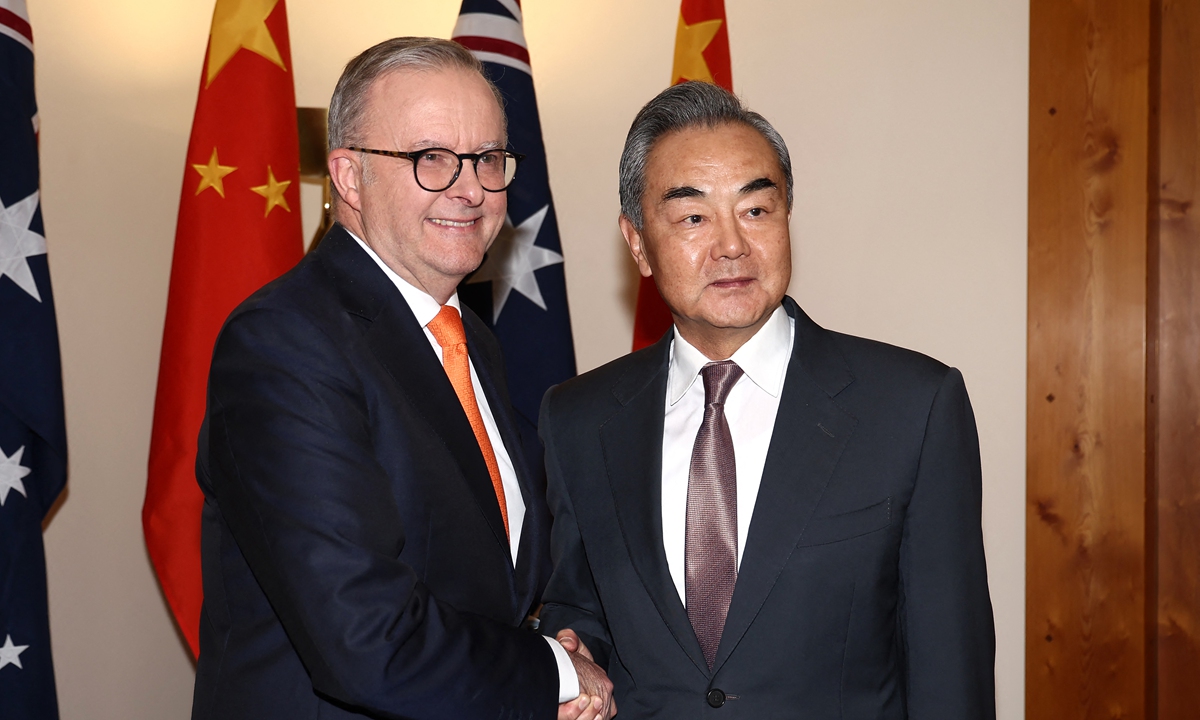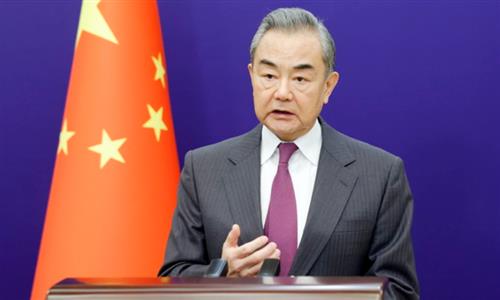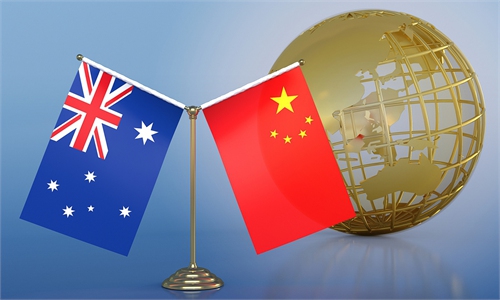
Chinese Foreign Minister Wang Yi, also a member of the Political Bureau of the Communist Party of China Central Committee, shakes hands with Australian Prime Minister Anthony Albanese during their meeting in Canberra on March 20, 2024. Photo: AFP
Since China-Australia relations are on the right track, both sides should have no hesitation, no yawing and no backward steps, and China is willing to work with Australia to further prepare for high-level exchanges between the two countries, restart consultation and dialogue mechanisms, and manage differences based on mutual respect, top Chinese diplomat Wang Yi told Australian Prime Minister Anthony Albanese in Canberra on Wednesday.
After bilateral relations enduring a tumultuous rollercoaster of ups and downs over the past decade, Wang embarked on a visit to Australia at a crucial stage of development of ties. Experts believe that his visit will not only help mend ties and foster mutual trust, but also push forward future development of bilateral relations.
Chinese experts urged Canberra to value the hard-won progress in restoring China-Australia relations and to avoid backtracking, saying the ball is in Australia's court to adopt a balanced perspective on its relationship with China, particularly in light of potential flashpoints such as human rights, the South China Sea, and Australia's alignment with the US in containing China.
Under the strategic guidance of the leaders of both countries, the obstacles encountered in the China-Australia relationship are being overcome, and pending issues are being properly resolved, Wang, Chinese Foreign Minister and also a member of the Political Bureau of the Communist Party of China Central Committee, told Albanese.
After the current Labor Party government came to power in Australia, the China-Australia relationship has undergone a second important transformation, which is in line with the interests of the Australian nation and people, as well as the current trend of development, said Wang.
Albanese said that in the past two years, Australia-China relations have returned to the right track, with trade, investment, and people-to-people exchanges becoming active again, continuously sending positive signals and achieving important breakthroughs.
Wang also held the seventh China-Australia Foreign and Strategic Dialogue with Australian Foreign Minister Penny Wong on Wednesday. Wang said the ups and downs of China-Australia relations in the past decade have not only left both sides with lessons to learn from, but also accumulated experience worth cherishing, namely mutual respect, seeking common ground, pursuing mutual benefit, and upholding independence and autonomy, according to a handout of the dialogue published by China's Ministry of Foreign Affairs.
The development of China-Australia relations doesn't target any third party, nor should it be influenced or interfered with by any third party, said the Chinese Foreign Minister.
"Australia seeks a mature, stable and productive relationship with China," Wong wrote on X on Wednesday. "Engagement and dialogue are important and enable us to pursue Australia's interests."
China's relationship with Australia has experienced significant ups and downs in the past decade, from a period of heightened cooperation in 2014 marked by high-level visits and the finalization of a free trade agreement, to a more contentious phase characterized by Australia's increasingly confrontational stance towards China on various issues, Ning Tuanhui, an assistant research fellow at the China Institute of International Studies, told the Global Times.
Ning noted Wang's visit came at a crucial juncture for the two countries to engage in dialogue on mutual concerns and work toward rebuilding trust. He described the Chinese foreign minister's reflections on past experiences in developing bilateral relationship as a guide for shaping the future direction of the relationship and help to steer it back to a positive trajectory.
Wang also said China is ready to work with Australia to prepare for high-level exchanges between the two countries.
High-level mutual visits are expected to play an important guiding role in enhancing the relationship between the two countries, said experts.
No backward steps
In her opening remarks, Wong said she looks forward to speaking frankly with Wang about issues such as human rights, maritime security and other regional as well as international issues.
Wang elaborated with Wong on China's principled position on the Taiwan question and issues related to Hong Kong, Xinjiang, Xizang and the South China Sea, stressing that there is no entanglement of historical problems or conflict of fundamental interests between China and Australia, and their common interests far outweigh the differences.
Although bilateral ties are expected to further stabilize after Wang's visit, Chinese experts still pointed out that human rights issue, Australia's interference in South China Sea issue and Canberra's willingness to follow Washington's Asia-Pacific strategy of containing China remain potential flashpoints.
In November last year, the Philippines and Australia began their first joint sea and air patrols in the South China Sea, a move which is targeted at China. The patrol came days after Manila took similar steps with the US.
"Whether those potential flashpoints will trigger new conflicts depends largely on whether Australia will take new or excessive moves to provoke China," said Ning. He believes that making biased accusations or unfair judgment against China is unacceptable.
Chen Hong, director of the Australian Studies Center of East China Normal University, said the administration of former Australian Prime Minister Scott Morrison was eager to serve as vanguard of the US to contain China. Yet such move has greatly harmed not only bilateral ties, but also Australia's interests.
In March last year, the US, the UK and Australia unveiled a roadmap for their AUKUS military cooperation. However, recently US President Joe Biden administration's new defense budget has halved its submarine production to the construction of just one Virginia-class submarine in 2025, down from an anticipated two.
This has raised questions over Washington's ability to fulfill its commitment to sell Canberra up to five of the nuclear-powered vessels starting in the 2030s.
Chen noted that it is not realistic for Australia to shake off influence from the US completely, but Canberra should stick to its strategic autonomy when dealing with China-related issues, and cherish the "hard-won" result achieved to restore China-Australia ties. "Just don't backtrack."
Broad exchanges
In Canberra, Wang also met with people from Australia's business, think tank representatives and other industries. He said now that China-Australia relations have embarked on a path of improvement, the two should take big steps forward to build a more stable and mature comprehensive strategic partnership, which will benefit the people of both countries and regional countries.
"For a whole host of reasons, whether it's the pandemic or just the way domestically politically we have approached China, the fact is our understanding of China and its role in the region and world is not as strong as it used to be," David Olsson, national president of Australia China Business Council, the organization who hosted the meeting between Wang, told reporters.
Chinese experts believed that once the Australia's business industry see the prospects of repaired bilateral ties, their interaction with China will further push for development of relations between the two countries.
Chen said economic and trade relations play a crucial role in China-Australia relations. Without the foundation of such a relationship, the recovery and improvement of bilateral ties would not have been as quick and easy.
Former Australian Prime Minister Paul Keating, who has criticized Australia's AUKUS nuclear submarine deal with the US, was quoted by Reuters as saying that he would meet Wang Yi this week in a bid to improve bilateral ties.
Australian opposition foreign affairs spokesman Simon Birmingham, along with a small number of Australian politicians, criticized the meeting, media reported.
Ning observed that the attitudes of Australian politicians reflect a lingering conservative perspective among some Australians regarding China's relationship with their country. This perspective is characterized by deep-rooted distrust and suspicion towards China.
Wang also met with Peter Dutton, leader of the Opposition. During the meeting, Wang said the development of China-Australia relations is the result of the joint efforts of all political parties in Australia. China is willing to maintain communication and cooperation with friends from all walks of life in Australia, and work together to build a more mature, stable and fruitful comprehensive strategic partnership, Wang said.



